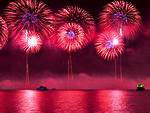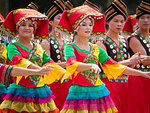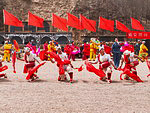Holidays in China
 Holidays in China are a colorful spectacle, more often being a theatrical performance. There are many traditional and religious festivals in China, in addition to official holiday dates. They include: New Year (January 1), Spring Festival (New Year according to the Lunar Calendar, celebrated during 7 days).
Holidays in China are a colorful spectacle, more often being a theatrical performance. There are many traditional and religious festivals in China, in addition to official holiday dates. They include: New Year (January 1), Spring Festival (New Year according to the Lunar Calendar, celebrated during 7 days).
Official public holidays in China:
- New Year (January 1);
- Spring Festival (New Year according to the Lunar Calendar, celebrated during 7 days);
- International Women's Day (March, 8);

- International Workers' Day (May, 1);
- China Youth Day (May, 4);
- International Children's Day (June, 1);
- Date of establishment of the People's Liberation Army of China (August 1);
- Teacher's Day (September, 10);
- Day of the PRC (October, 1), is celebrated for seven days;
- Zhongqiu holiday (mid-autumn);
- Qingming Festival (4-6 April), the remembrance of the fallen heroes;
- Dragon Boat Festival holiday, or dragon boat (5 day of the fifth month of the lunar calendar).
China is populated by national minorities, who also have their own specific holidays. Among them are "Water Festival" among the Mongols, the harvest festival "Vango" among the Tibetans, Navruz among the Uyghurs, and many others. However, they are of local nature rather than public one.
 In addition, all holidays in China are divided into traditional and nationwide. China's traditional festivals are celebrated by the Lunar Calendar. The national and borrowed holidays are observed by the Gregorian calendar.
In addition, all holidays in China are divided into traditional and nationwide. China's traditional festivals are celebrated by the Lunar Calendar. The national and borrowed holidays are observed by the Gregorian calendar.
The Chinese consider the holidays to be their cultural heritage, so they are very serious about the preparation for them. Many festivals last for several days and are a grand performance for the country's inhabitants and tourists.

